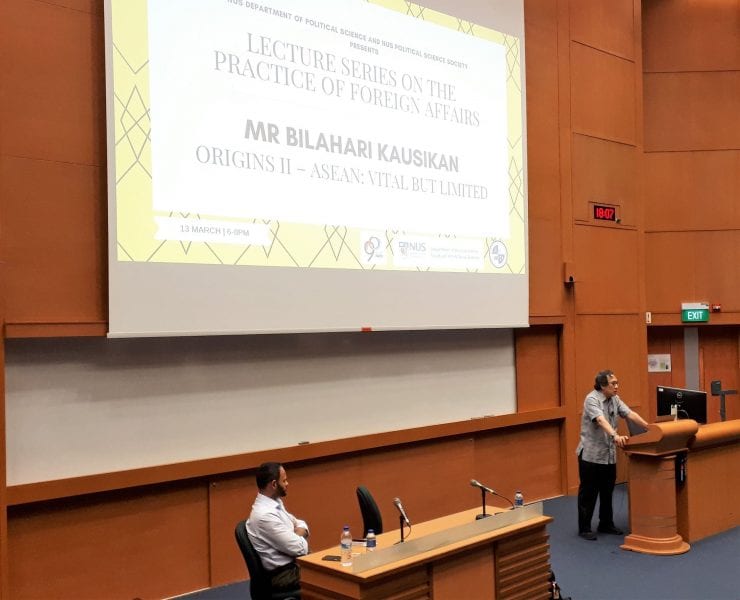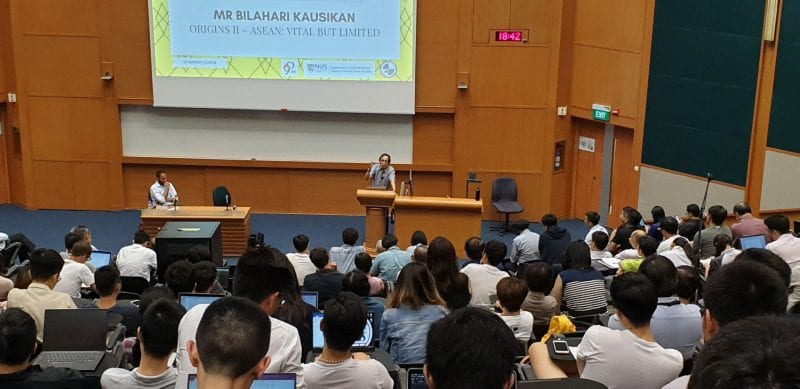Mr Bilahari Kausikan spoke at length about how US-China relations today affect the current global and regional political order on 20 March 2019 at his fourth FASS90 Political Science Lecture on the Practice of Foreign Affairs.
He was keen to emphasise that despite some similarities, Sino-American relations today are fundamentally different from those between the US and the Soviet Union during the Cold War. “The post-Cold War (world) is complex, not binary,” he stated.

“US-China Relations are Inextricably Entangled in a Way US-Soviet Relations Never Were”
Following the dissolution of the Soviet Union in 1991, the Cold War-era of international political structure that had persisted for more than four decades abruptly came to an end. “Despite its many dangers, the Cold War international order was clear and simple; essentially binary in structure,” said Mr Kausikan.
“You were either on one side or the other. Even if you tried to be or pretended to be non-aligned, you essentially defined your interests in relation to this binary structure. This entrenched a mode of thought: a binary view of the world that is still a powerful albeit usually unconscious, but certainly inappropriate influence on how we understand the trope of China’s rise.”
The biggest difference in today’s US-China relations compared to US-Soviet relations during the Cold War was how interlinked America was with each at the time. The Soviet Union “largely contained itself by pursuing autarky,” Kausikan said. “The US and the Soviet Union interacted only tangentially; their relationship was structured primarily by the need to avoid mutual destruction.”
This is unlike China today, which is inseparably inter-connected with the American economy and that of the world. “Unlike the Soviet Union, China is an irreplaceable node in the global economy, as vital as the American economy,” he stated. “US-China relations are simultaneously inter-dependent in a way that is historically unique between major powers, and simultaneously infused with a deep strategic distrust.” Yet despite this distrust, Kausikan was adamant that Sino-American rivalry was not a zero-sum game as some claim. “China’s rise is not necessarily America’s decline, except in relative terms,” he said, dismissing it as another relic of an outdated Cold War-era mentality.

America: “Spreading the Burden of Leadership”
Mr Kausikan also noted that despite their vast differences, “both Obama and Trump are iterations of the post-Cold War metamorphosis of American values.” Both have attempted to spread the burden of leadership, particularly defence costs, onto America’s allies; Obama merely did so in a more tactful manner than his successor.
In fact, Kausikan was of the opinion President Trump and his tough stance toward China was not a passing phase but a permanent shift in American policy. “Trump is not an aberration that will pass with the next administration,” he stated. “Key elements of his foreign policy, in particular the tougher approach to China as a strategic competitor enjoy strong bipartisan support across many policy domains.”
“Trump’s successor may speak more prudently and act more predictably, but the probability is that whoever succeeds Trump will represent the same political phenomenon and pursue much the same policies, at least towards China.”
China: Globalisation’s Biggest Winner, Protectionism’s Biggest Loser
This new hostile American stance to both China and globalisation will have serious implications for China, particularly for its ambitious Belt and Road Initiative. “China was the main beneficiary of the American-led post-Cold War globalisation. China may well be the main loser if that order should further fray because the US now embraces a narrower concept of leadership,” Mr Kausikan noted.
“Can the Belt and Road Initiative succeed if the world turns protectionist as a result of the trade war? I don’t think so. More to the point, I don’t think the Chinese think so either.”
And despite its undeniable position as an economic superpower, Kausikan was not optimistic that China could be a substitute for American leadership in the global economy. “An open global order cannot be led on the basis of a still-largely closed and mercantilist Chinese model,” he remarked, especially when “Chinese growth rests on that open international order.” As such, he feels that some sort of temporary truce will be called on the ongoing trade war, although it would likely be “a very bad deal, and both sides will have the incentive to get out of it as soon as possible.”
Engagement Still the Main Tone of US-China Relationships
Nevertheless, Mr Kausikan emphasised that despite the rancour of the trade war, the central theme of US-China bilateral ties was that of engagement and communication. “War is highly improbable, nuclear deterrence impels caution, engagement will not cease and the US and China will still cooperate when their interests coincide,” he stated. Given how closely the two countries are tied to each other and the rest of the world economically, a continued policy of engagement would bode well for all sides.
Watch the lecture here.
—-
About the Speaker
Bilahari Kausikan is Chairman of the Middle East Institute, NUS. From 2001 to 2013, he was first the second Permanent Secretary and then Permanent Secretary of the Ministry of Foreign Affairs (MFA). He was subsequently Ambassador-at-Large until May 2018, having previously served in various MFA appointments, including as the Deputy Secretary for Southeast Asia, the Permanent Representative to the United Nations in New York and as Ambassador to the Russian Federation.
FASS90 Political Science Lecture Series on the Practice of Foreign Affairs
This five part lecture series is organised by the NUS Political Science Society with support from the Faculty of Arts and Social Sciences (FASS) and the Department of Political Science. Established in 1929, FASS, one of the earliest and largest faculties is celebrating its 90th anniversary this year. Whilst witnessing numerous changes, we remain steadfast to our vision to strive forward as a premier faculty of excellence in humanities and social sciences that nurtures tomorrow’s engaged, thoughtful and creative global citizens. To mark this occasion, the Faculty is organising a series of events showcasing the strength and breadth of the Faculty’s research as well as kick start future initiatives that would benefit the generations of students who will come through our halls.



